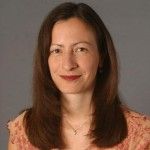Living Writers Series Features Deborah Treisman

Deborah Treisman was 11 years old when she received her first literary rejection from “The New Yorker.” Now Treisman is the one calling the shots – choosing one short story from hundreds of monthly submissions as the esteemed publication’s fiction editor.
Sitting onstage in Persson Auditorium on Thursday, September 27, Treisman had little to prove. Born in Oxford, England and a University of California Berkeley graduate at age 16, she was deputy fiction editor of “The New Yorker” for five years and, previously, managing editor of “Grand Street,” a literary quarterly. Treisman is the second woman to hold the job of fiction editor at “The New Yorker.” Young and dynamic for the prestige of her title, Treisman can proudly admit to having shaped the landscape of contemporary fiction while sitting behind her desk.
Associate Professor of English Jennifer Brice and Thomas A. Bartlett Chair and Professor of English Jane Pinchin conducted the third Living Writers event of the 2013 fall series by interviewing Treisman on a variety of issues, from her views on gender equality in the world of fiction to the fears of over-editing.
“The passage of time and general changes to the social world have engendered a huge increase in the number of women writing fiction,” said Treisman.
Speaking from personal experience as a mother, Treisman admitted that raising young children does not leave much time for writing or reading. However, as women are beginning to start families later in life, some find time to develop successful literary careers. Our contemporary, fast-paced world has further transformed the art of fiction writing. Treisman suggested that story collections, such as those that jump-started Jhumpa Lahiri’s and Junot D?-az’s careers, have
become popularized by a readership who values each minute of the day.
“People are more willing to take 20 minutes to enjoy a short story rather than the many hours which a novel requires,” Treisman said.
Commenting on the editing process, Treisman admitted that she struggles with humor. The editor noted that the group setting in which she works is especially useful in balancing each individual’s unique tastes, as well as their strengths and weaknesses as a reader. Pointing to unorthodox use of language as one aspect of a manuscript that appeals to her, Treisman admits that there is no objective way to judge a story as good or bad. However, according to Treisman, an author with a strong, unique voice can universally inspire almost every reader to keep turning pages.
“The writer that excites me is one that has so much verve – the way that they can shock the reader and having a solid emotional impact,” Treisman said.
It is the editor’s responsibility, then, to get the author to reveal more without telling them how to do so. Treisman doesn’t like to generate the raw material but instead make an already created piece of writing better, usually through perfecting beginnings and endings of stories.
“Sometimes an author just goes on too long – I understand why, it’s hard to let go of your own art when you’ve become so invested,” Treisman said.
To future poets, novelists and editors sitting in Persson Auditorium, Treisman advised to read obsessively and utilize internship opportunities. Exposure to the field only goes so far, though, for burgeoning editors; Treisman believes that instinct plays a defining role in acquiring good editing technique.
“As for those of you in the audience who want to write, don’t do it if your goal is publication,” Treisman said. “If you are writing with your marketability in mind then you will never find your true voice. Write for personal development, write for you.”
Contact Leah Robinson at [email protected]



